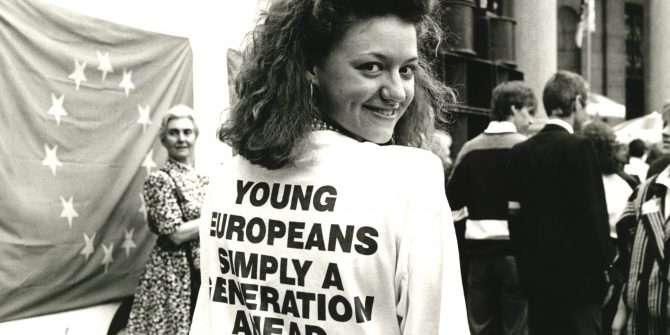 As the EU’s infamous ‘awkward partner’, the UK has a rich history of not quite getting what it means to be European. The latest round of Brexit negotiations are no exception. Zoë Jay (University of Tasmania) explains why misunderstanding the EU means misunderstanding the UK, and that makes it harder to leave.
As the EU’s infamous ‘awkward partner’, the UK has a rich history of not quite getting what it means to be European. The latest round of Brexit negotiations are no exception. Zoë Jay (University of Tasmania) explains why misunderstanding the EU means misunderstanding the UK, and that makes it harder to leave.
Continuing with his trademark flying-by-the-seat-of-his-pants approach to diplomacy, Prime Minister Boris Johnson was reportedly ‘surprised’ the other week to discover mid-meeting with Michel Barnier and Jean-Claude Juncker that the UK’s plan for Northern Ireland to keep the common EU rules on food and livestock would only scratch the surface of what is needed to solve the issue of the Irish backstop. Officials described watching the ‘penny dropping’ as Johnson turned to ask his chief negotiator David Frost and Brexit Secretary Stephen Barclay, ‘So you’re telling me the SPS plan doesn’t solve the customs problem?’
Not to be outdone, former Prime Minister David Cameron in the same week described his efforts as PM to pass legislation that would ensure ‘UK law was ultimately supreme over EU law.’ He claimed it was an attempt the placate a rebellious Johnson and hard-line Eurosceptics within the Conservative Party. The effort was ultimately fruitless: as Cameron put it, ‘instead of pushing the boundaries to make the EU’s legal order more tolerable’, the government lawyers he put on the case ‘were determined to play strictly by the rules.’ As long as the UK is still a member of the EU, the European Communities Act (1972) means that in areas where the EU has competence, European law sits above domestic law. But the example betrays Cameron’s belief that the central principle of the European legal order could be skirted or watered down to suit British political goals.

Does the UK know how the EU works?
These cases are the latest in a long line of examples of British leaders seeming not to understand (or care about) basic features of the EU and how it operates.
These apparent misunderstandings range from differences in approaches to diplomacy (such as Theresa May’s and Johnson’s assumptions that the UK would be able to strong-arm the EU into accepting the UK’s Brexit demands vs the EU’s compromise- and consensus-based approach to decision-making), to confusion about what the UK will be able to do during and after the Brexit transition (for instance, trade minister Liam Fox’s 2017 promise that the UK would be able to sign new free trade deals the ‘second after’ Brexit).
Similarly, assumptions that the UK could ‘cherry pick’ which parts of the Single Market it could retain after leaving the EU showed a fundamental misunderstanding of the importance of the Market’s four freedoms (goods, services, capital and labour) being a complete package. This one was such a contentious point at the 2018 Salzburg Summit that Theresa May was famously mocked by President of the European Council, Donald Tusk, who posted a photo to Instagram of him offering cake to May with the caption ‘sorry, no cherries.’
Worsening matters even further is the long-running habit among British politicians and media of conflating separate European institutions. For instance, the frequent muddling of the European Court of Justice and the non-EU European Court of Human Rights creates the impression that both courts, each a headache for British courts in the eyes of Eurosceptics in their own rights, have twice as much influence over British law as either actually does – a perception best demonstrated in the outrage expressed by Nigel Farage following May’s 2017 announcement that the UK would stay in the ECHR at least until after EU-Brexit is complete.
For Eurosceptics, determined to get the UK away from Europe in all its forms the distinction between the EU and other European institutions is moot. Nonetheless, ambiguous references to a singular, behemoth ‘Europe’ exacerbate misunderstandings about the exact role the EU plays in the British political system, making the process of disentangling the UK from it harder.
What does it matter?
What exactly does not understanding the EU mean for the UK? The Brexiteer answer might be that it is simply more evidence that the UK is right to leave the EU, a ‘foreign’ institution that misunderstands the UK just as much as the other way around. But there are several other reasons why it matters, which have consequences for both UK-EU relations, and for the UK’s own political future.
In the immediate term, it keeps the UK on the back foot in Brexit negotiations. Boris Johnson is known for winging his way through speeches and meetings, but this approach doesn’t work when the meetings concern the complicated technical details of trade negotiations or finding solutions for a frictionless border in Ireland.
It also puts the UK at a disadvantage when the negotiating partner comes to meetings much more prepared. The EU has to look out for the needs of its 27 very different member states, something it can only do with meticulous planning and compromise well before meetings are scheduled. Every time the UK has tried to cherry pick the parts of the EU that suit it, or skirt the EU Commission’s demands by going directly to national leaders, it reveals an inability to understand the power of the EU as a united front. Consequently, the UK fails to achieve what it wants. The lesson for the UK is clear: to paraphrase Sun Tzu in The Art of War, ‘if you know neither the EU nor yourself, you will succumb in every negotiation round.’
The lack of understanding of the EU also poses serious challenges for the UK’s domestic political system. In the forty-six years since the UK joined the European Community, what were once relatively distinct ‘domestic’ and ‘European’ spheres have become increasingly interconnected. To unravel these spheres requires detailed understanding of precisely where the EU ends and ‘taking back control’ begins.
Yet, as tensions within the UK between the government, Parliament and courts over the prorogation of parliament have shown, the question of who has authority in what circumstances is a delicate one. Shifting authority from one body to another is much easier said than done, both among domestic branches of government and between the UK and EU. In a constitutional system that relies on norms and conventions, rather than a formal written document, misunderstanding one seemingly separate area of politics can have flow-on effects as misinterpretations lead to changes in how conventions are applied and practised.
But most importantly, the lack of understanding ties in to a well-established theme in many British politicians’ attitudes towards Europe. Showing up to meetings unprepared, trying to find ways to work around European law, and conflating separate institutions sends a message that the UK doesn’t think the EU is important enough to warrant learning about.
This has long been a sore point between Britain and the continent, and will likely be the source of many misunderstandings to come. At best, this means Boris Johnson can continue to bluster his way through negotiations, appeasing Leavers’ anti-EU sentiments and hoping his advisers and diplomats fill in the policy gaps along the way. At worst, the rifts caused by misunderstandings will widen as Brexit negotiations continue, making the UK’s eventual future outside the EU very awkward indeed.
This post represents the views of the author and not those of the Brexit blog, nor LSE. Image: Anders Hanser CC BY 3.0.
Zoë Jay (@zoecharlottejay) is a lecturer in Politics and International Relations at the University of Tasmania. She completed her PhD in 2018, having examined how domestic political cultures shape European democracies’ decisions to comply with the European Court of Human Rights. Her research broadly focuses on British and European politics, human rights, and the politics of international law.







Some good points here.
I cannot understand how politicians educated at good schools like Eton and good universities like Oxford have such little basic understanding of how the EU works., They also do not understand how the UK has become increasingly intertwined with the EU since joining the then EEC in 1973, over 45 years ago. The generation of politicians in charge now, in their 40s and 50s, have known nothing but a UK massively affected on all fronts by the EU.
It won’t do to put your fingers in your ears and go “Ba! Ba! Go and leave me alone. I am Great Britain, and you are Little Europe!”. What are the detailed plans for the future of the UK in a globalised world with international laws and regulations all over the place? How will the UK relate to the EU, even if Brexit does take place, as the EU will still by far be it’s major export market, and will be by far the closest major power in a multi-polar world dominated by major powers.
@Friedrich: “I cannot understand how politicians educated at good schools like Eton and good universities like Oxford have such little basic understanding of how the EU works” My guess is that if you are educated at Eton and then go on to do Greats at Oxford, like Boris Johnson, you will spend more time learning about the Pelopponesian War between Ancient Athens and Sparta than about the way the European Union works. This may or not be a good thing, there is a lot to be said for studying the Classics.
It would be interesting to know how the subjects covered in the education (school and University) of various politicians around Europe have influenced their thinking. I suspect quite a lot. For example I get the impression that in Germany pupils spend as much time learning about the Third Reich than any other historical subject, which has a lot to do with the way Germans view politics.
i am 70 years old, i voted to join the common market when i was young and daft.after a few years i felt it was not as told i then wanted out there was no mention of armed forces ever closer union .flags and anthems……and yes the unending gravy train for those in power.i could go on ……
“….. it reveals an inability to understand the power of the EU as a united front. Consequently, the UK fails to achieve what it wants. The lesson for the UK is clear: to paraphrase Sun Tzu in The Art of War, ‘if you know neither the EU nor yourself, you will succumb in every negotiation round.’”
Surely, the problem here is mostly within the UK. The Brexiteers assumed with good justification that if they won the referendum, then the country would pull together to try to achieve the best terms for departure. But that didn’t happen. It was easy for the EU to show unity when the UK was so split. If one side is united and the other is split then the united side always wins the negotiation.